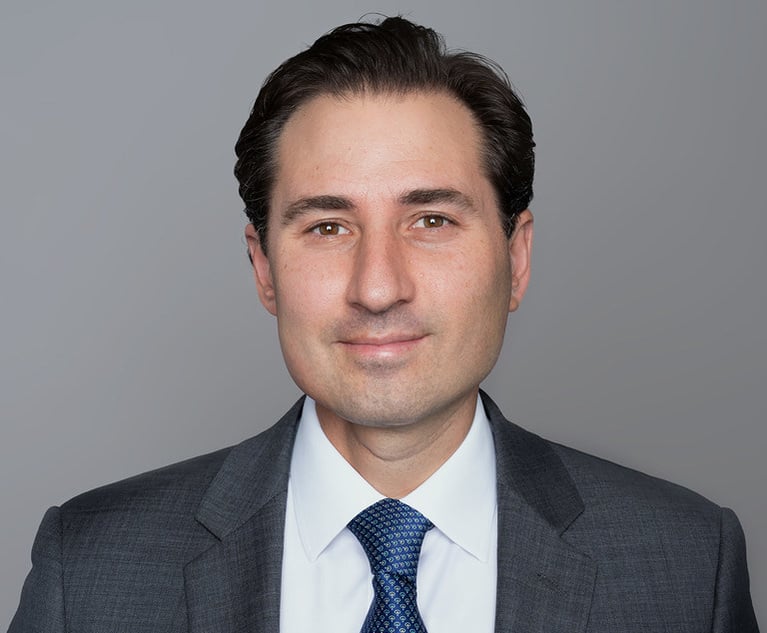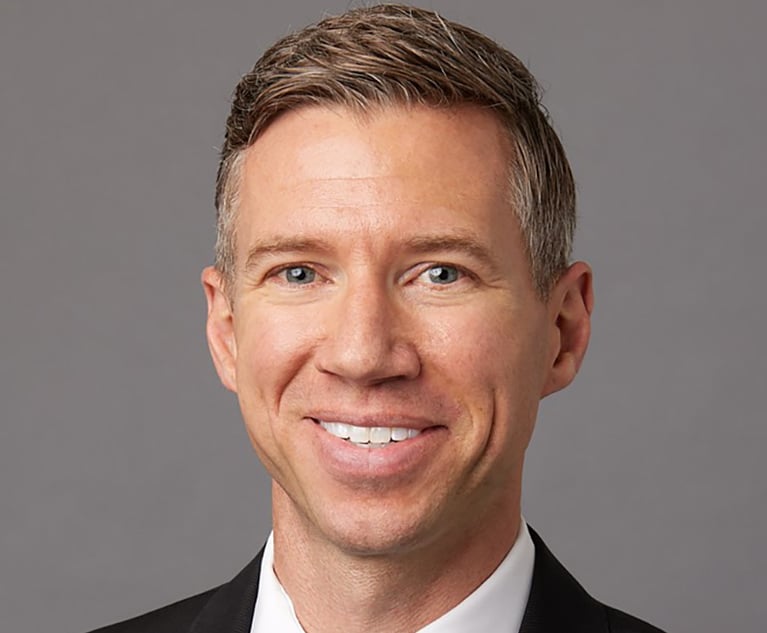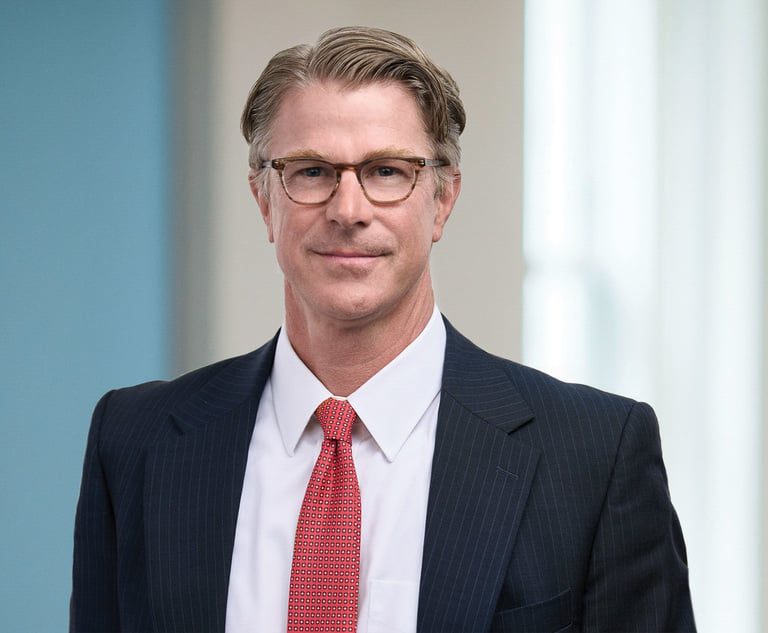How I Made Partner: Orrick's Emily Tabatabai
The career path of this cybersecurity lawyer was unconventional, and she advanced at her own pace.
November 09, 2018 at 12:09 PM
5 minute read

Emily Tabatabai, 39, Orrick, Herrington & Sutcliffe
Offices: Houston and Washington D.C.
Practice area: Cyber, privacy and data innovation.
Law school: University of Virginia School of Law, 2006.
Number of years at the firm: 12 (Orrick “lifer”).
How long were you an associate or counsel at the firm? Nine years as an associate; two years as of counsel.
What year did you make partner at your current firm? 2018.
 Emily Tabatabai.
Emily Tabatabai.
What do you think was the deciding point for the firm in making you partner? My path to partnership was quite unconventional, and I advanced at my own pace. Though I've been with the firm since I was a summer associate, I haven't always followed the typical “partner track” route. I worked on a flexible schedule (anywhere from 60 percent to 85 percent) for several years while my children were young. When I relocated with my family to Texas seven years ago, the firm supported my working entirely remotely. (Today the firm has two offices in Texas). I was promoted to of counsel four years later, while still working remotely on a reduced hour schedule, and then to partner two years after that.
After all of that, I'm still somewhat amazed to find myself here today as a partner. It certainly helps that I have deep subject matter expertise in a specialized area of law that impacts almost all of our firm's clients. Because of that reach, I have had the opportunity to collaborate and build relationships with dozens of partners across virtually all of our offices and practice groups.
What's more, I think the firm recognized and valued my drive to take ownership over my practice and develop new expertise in burgeoning industries, technologies and areas of law. I began focusing on data privacy matters more than a decade ago, when there were few practitioners in the field and even fewer firms with privacy-focused practice groups. With the firm's support, I co-founded our U.S. data privacy practice that grew into our globally recognized Cyber, Privacy and Data Innovation team.
Describe how you feel about your career now that you've made partner. I'm incredibly fortunate to work in an area on the cutting edge of today's technological explosion, and one that is undergoing rapid legal and regulatory transformation. It's a privilege to help our clients navigate these changes—and only more so as a partner. At the same time, I'm grateful to Orrick for the firm's unwavering support and for providing the flexibility I needed to grow my career at a pace that worked for me.
What's the key to successful business development in your opinion? Be an expert in a topic that interests you, and push yourself to keep learning. Always think about what's coming next and how you can help your clients see around corners. Share your knowledge by writing, speaking and just getting out and having conversations with people in your industry. Start early. You're never too young to demonstrate your inquisitiveness, enthusiasm and ability to think critically about issues. Build relationships. Seek out lawyers, academics, business folks and other professionals in your field. You'll be amazed at what a powerful network you develop over time—and how much fun it is.
Who had the greatest influence in your career that helped propel you to partner? Please provide name, job title and a brief explanation. I have been fortunate to work with many fantastic colleagues who have mentored and supported me throughout my career, but two Orrick partners stand out in helping to shape my career. Garret Rasmussen, partner in the antitrust group, encouraged me to develop my expertise in privacy law and pushed me to take ownership of my career trajectory when I was just a junior associate. I wouldn't be here today without Tony Kim, partner in cyber, privacy and data innovation practice, who has been my constant collaborator, mentor, champion, partner and friend.
What's the best piece of advice you could give an associate who wants to make partner? Find your “thing” and become an expert. Become indispensable. Seek out great mentors and work with people you enjoy and respect. Most importantly, never be afraid to ask for what you need. We work in a tough industry with clients who demand excellence at all times. It's unfortunate, though not at all surprising, how many talented associates leave law firm life when the challenge of maintaining a breakneck pace becomes unsustainable. I always encourage associates to remember that situations change and that your career is a marathon and not a sprint. Before you close a door, think about whether there are any changes you can make—even temporarily—that could help strike the balance you need at that time in your life. Be honest with yourself and your colleagues about what you need to be successful in your career, and don't be afraid to chart an unconventional path.
|Got a suggestion for a new partner to profile in this column? Email [email protected].
|This content has been archived. It is available through our partners, LexisNexis® and Bloomberg Law.
To view this content, please continue to their sites.
Not a Lexis Subscriber?
Subscribe Now
Not a Bloomberg Law Subscriber?
Subscribe Now
NOT FOR REPRINT
© 2025 ALM Global, LLC, All Rights Reserved. Request academic re-use from www.copyright.com. All other uses, submit a request to [email protected]. For more information visit Asset & Logo Licensing.
You Might Like
View All
US Patent Innovators Can Look to International Trade Commission Enforcement for Protection, IP Lawyers Say

How I Made Law Firm Leadership: 'It’s Imperative That You Never Stop Learning,' Says Ian Ribald of Ballard Spahr

How I Made Practice Group Chair: 'It's Essential to Have a Clear Vision,' Says Matthew Carey of Marshall Gerstein

How I Made Office Managing Partner: 'Be a Lawyer First, Foremost and Always,' Says Matthew McLaughlin of Venable
Trending Stories
- 1'True Leadership Is About Putting Others First': 2024 In-House Award Winners Inspired, Took Road Less Traveled
- 2A Q&A with Sidley Austin's London Leader
- 3New York-Based Harris Beach Combines With Connecticut-Based Murtha Cullina, Forming NE Powerhouse
- 4New Year, New Am Law 100: Challenges Await These Newly Merged Law Firms
- 5Thursday Newspaper
Who Got The Work
Michael G. Bongiorno, Andrew Scott Dulberg and Elizabeth E. Driscoll from Wilmer Cutler Pickering Hale and Dorr have stepped in to represent Symbotic Inc., an A.I.-enabled technology platform that focuses on increasing supply chain efficiency, and other defendants in a pending shareholder derivative lawsuit. The case, filed Oct. 2 in Massachusetts District Court by the Brown Law Firm on behalf of Stephen Austen, accuses certain officers and directors of misleading investors in regard to Symbotic's potential for margin growth by failing to disclose that the company was not equipped to timely deploy its systems or manage expenses through project delays. The case, assigned to U.S. District Judge Nathaniel M. Gorton, is 1:24-cv-12522, Austen v. Cohen et al.
Who Got The Work
Edmund Polubinski and Marie Killmond of Davis Polk & Wardwell have entered appearances for data platform software development company MongoDB and other defendants in a pending shareholder derivative lawsuit. The action, filed Oct. 7 in New York Southern District Court by the Brown Law Firm, accuses the company's directors and/or officers of falsely expressing confidence in the company’s restructuring of its sales incentive plan and downplaying the severity of decreases in its upfront commitments. The case is 1:24-cv-07594, Roy v. Ittycheria et al.
Who Got The Work
Amy O. Bruchs and Kurt F. Ellison of Michael Best & Friedrich have entered appearances for Epic Systems Corp. in a pending employment discrimination lawsuit. The suit was filed Sept. 7 in Wisconsin Western District Court by Levine Eisberner LLC and Siri & Glimstad on behalf of a project manager who claims that he was wrongfully terminated after applying for a religious exemption to the defendant's COVID-19 vaccine mandate. The case, assigned to U.S. Magistrate Judge Anita Marie Boor, is 3:24-cv-00630, Secker, Nathan v. Epic Systems Corporation.
Who Got The Work
David X. Sullivan, Thomas J. Finn and Gregory A. Hall from McCarter & English have entered appearances for Sunrun Installation Services in a pending civil rights lawsuit. The complaint was filed Sept. 4 in Connecticut District Court by attorney Robert M. Berke on behalf of former employee George Edward Steins, who was arrested and charged with employing an unregistered home improvement salesperson. The complaint alleges that had Sunrun informed the Connecticut Department of Consumer Protection that the plaintiff's employment had ended in 2017 and that he no longer held Sunrun's home improvement contractor license, he would not have been hit with charges, which were dismissed in May 2024. The case, assigned to U.S. District Judge Jeffrey A. Meyer, is 3:24-cv-01423, Steins v. Sunrun, Inc. et al.
Who Got The Work
Greenberg Traurig shareholder Joshua L. Raskin has entered an appearance for boohoo.com UK Ltd. in a pending patent infringement lawsuit. The suit, filed Sept. 3 in Texas Eastern District Court by Rozier Hardt McDonough on behalf of Alto Dynamics, asserts five patents related to an online shopping platform. The case, assigned to U.S. District Judge Rodney Gilstrap, is 2:24-cv-00719, Alto Dynamics, LLC v. boohoo.com UK Limited.
Featured Firms
Law Offices of Gary Martin Hays & Associates, P.C.
(470) 294-1674
Law Offices of Mark E. Salomone
(857) 444-6468
Smith & Hassler
(713) 739-1250








